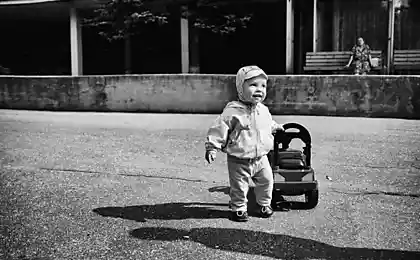692
Differences in the education of "wild" tribes and "civilized" society from birth. Part 2

Yet every impression we have, independently of other impressions, is necessary for the development of some aspect of personality. Without the necessary impressions, a person cannot develop correctly; when the required experience is accumulated, further development becomes possible. Opportunities for new experiences must be diverse.
Russian teacher researcher Mikhail Petrovich Shchetinin writes: “By driving children into the framework of the usual, “forever given”, protecting them from struggle, we thereby deprive them of the feeling of their importance on earth...” The child is eager for a serious dialogue with life, having both the right and the opportunity to do so.”
It is necessary that there are more objects, situations and people around the child than he can use at the moment, so that he can discover and expand his abilities, but not too many so that he can focus on one thing if he wants. In this case, it is not desirable to change the environment in the room where he spends most of the time. Masaru Ibuki writes, “Children do not perceive objects in isolation, but in connection with each other.” This, in turn, contributes to their development, so we as adults should avoid abrupt changes that can disrupt the child’s perception of sustainability and order in the world.”
With constant awareness and application of this on the part of parents, the child does not require the full attention of the mother, because he is not burdened by the load of unrealized unconscious desires, and the state of things in the present is completely satisfied. In nature, everything is arranged economically, and the child does not require more than he really needs.
The child gathers the necessary experience for development. It doesn’t matter even if it wasn’t complete and events happen in the wrong sequence. By the end of this accumulation, the child must have the minimum of experience of each species, which is used as the foundation for a new stage of experience. If the necessary minimum is not reached, then the events of the new stage, if they occur even a thousand times, will not be perceived by the child and contribute to the formation of his personality.
The child, who is not held in his arms, not only accumulates experience, but also tries to somehow replace the lost experience and alleviate suffering. He furiously kicks his feet, trying to score an excruciating desire for touches of warm flesh, he waves his hands, turns his head from side to side to turn off his senses, strains his body, arching his back. And these are clear signs that parents need to change their behavior and care for the baby.
If the need for constant contact with the mother was completely satisfied by this time, then the need to be on the hands quickly disappears, and the child begins to live off the energy accumulated during the “manual period”, which requires nourishment only in extreme situations. Then he will turn to his mother for support. These emergencies are becoming rarer and the child’s independence is being strengthened comprehensively and rapidly.
The uneven development of the child (in one direction he goes forward, in the other he lags behind and waits for the opportunity to get the missing experience) leads to a split of his desires: in any of his actions he wants to be the center of attention; he can never fully focus on the task at hand, while part of his soul still craves a carefree existence in the arms of the mother, solving all problems.
1.3. Childhood
Man needs a chain of successive events that meet his expectations and trends, and that take place under conditions in which those expectations and tendencies were formed earlier in his ancestors. These conditions include the “right” attitude of other people, that is, satisfying the true needs of a person.
In the arms of the mother, the child feels that everything is as it should be. He knows nothing about himself except that he feels right, attractive and desirable. Without this belief, a person of any age is flawed: he does not believe in himself, feels deprived, he lacks spontaneity and grace.
Immediately after birth, the baby is extremely susceptible. He is unable to think rationally, consciously remember, think or reason.
All children are right, but they can only know through reflection, through the way they are treated.
If the mother, when replacing diapers or diapers, turns to the side, disgust is reflected on her face, she tries to do everything quickly and she does not have a smile on her face, the child very clearly catches this and puts it in memory. The more the child is aware of this attitude of the mother, the more embarrassment is mixed, a harbinger of fear and guilt.
Fear of upsetting your mother grows with consciousness. He can begin to take various actions to change the situation: grab his mother’s hair, tip a plate of food, drool her clothes, poke a finger in her mouth, pull a necklace, throw his rattle, try to get out of the wheelchair or accidentally knock down a cup of tea.
It is difficult for a child to associate his actions with his reaction. He does not notice that the cup of tea has fallen, he cannot understand what is wrong with grasping the necklace, and why the mother is so angry after that; he does not realize that he has drooled any thing; he only vaguely realizes that by dropping a plate of oatmeal in order to attract interest in his person, he does attract attention, but it is a pity only not that he would like.
And yet the child feels that even such attention is better than nothing, so he continues to dump dishes with his food on the floor. He wants a sense of “rightness” that is hidden somewhere here: in his mother, in his food, in himself. But no matter how much he tries to show his needs, this feeling never comes. On the contrary, the child’s violent reaction provokes rejection in the mother, which he will eventually be able to somehow explain to himself – in contrast to the endless wrong attitude in the first months of life, which he could not understand at all. Indifference, inattention and longing became for him the main parameters of this life. He knew nothing but that. It turns out that his whole being screams, asks and waits. All the rest remain indifferent, inactive, inattentive. Although this goes through his life, he may not notice these moments, for the simple reason that he can not imagine other relationships with others.
The sense of self-righteousness is the only feeling of man in relation to himself, on the basis of which the individual can build his prosperous existence.
Without a sense of correctness, a person cannot determine how much comfort, security, help, communication, love, friendship, pleasure, joy. A person without this feeling usually thinks that “happiness is where we are not.”
To be treated properly, babies have to be extremely attractive. After all, they are small, weak, slow, defenseless, inexperienced, dependent on older people, but attractiveness compensates for all these shortcomings.
It does not matter who plays the role of father or mother, male or female, for the infant there is only one relationship - the relationship with the mother, and each of us has the ability to accurately recognize the wordless language of the newborn and act in accordance with it. Each of us, be it a man, a woman, a girl or a boy, has a thorough knowledge of child care, despite the fact that recently, that is, not more than a few thousand years ago, we have been led by the fantasies of the intellect in this extremely important matter. We have gone so far from our own innate abilities that we have almost forgotten their existence.
As the child’s expectations are met and he becomes psychologically developed and ready for new experiences, he gives a signal that means changing expectations in accordance with his internal impulses. It is the task of parents to understand this and behave in accordance with the new expectations of the child.
Initially, the baby learns only what belongs to the lifestyle, which, as follows from the circumstances, then becomes his own.
Just as a radio receiver, at the behest of a person wishing to listen to a particular radio transmission, is tuned to receive waves of a certain length, although the receiver can work on other waves, psychobiological perception initially has great potential, but soon narrows to the necessary range for life.
Hearing is also selective, limited to what is considered necessary in our culture. The rest is discarded. Our ears can hear more sounds than we normally do.
The range of hearing of Indians is suitable for their needs. Ours suits us better, because it saves us from sounds that would be meaningless noise to us. In our culture, it would be unpleasant, for example, to wake up in the middle of the night because a car passed by.
To prevent the brain from drowning in the sea of sensations, the nervous system acts as a filter. Receptivity to sounds can be increased or weakened without any volitional effort in accordance with the attitudes of the nervous system. Although hearing never stops working, some audible sounds never reach consciousness and remain in the subconscious from infancy to death.
What are commonly called supernatural or magical powers are often merely abilities that the nervous system (at the request of the conditions of life) excludes from the set of possibilities we use. They can be developed by a practice aimed at disabling the normal weeding process. Sometimes they can occur in extreme circumstances.
Supernatural powers are released only in special cases. There are many cases of the appearance of temporary or permanent psychic abilities of people after some extraordinary incident.
A curious exception to this rule are people whose weeding mechanisms have been temporarily or permanently corrupted in one way or another. Such people become clairvoyant under favorable circumstances.
Normally, the normal boundaries of human perception are violated under conditions of extreme emotional stress. When accident victims suddenly see the inevitability of their death, they desperately appeal to their mother or to someone who takes the mother's place in their feelings. This call often reaches the mother or person person personifying the mother, across any distance. Example: a recent case from the war, published on the website www.mera.com.ru, in which a soldier appealed to his wife before being shot, and she felt the call.
A premonition arises differently: an unknown event that threatens terrible consequences can break into the consciousness of a completely calm person, in a dream or in reality. Most premonitions are ignored because of the prohibitions to believe in “such nonsense” and are not even aware.
As for other human abilities, the Indians of South America, for example, can see the silhouette of a small bird among the shadows of the walled jungle, while we see only the leaves, even if we are given a place. They see fish in the foam of the mountain streams, and we, again, even with all our desire, do not notice anything. Children raised by wolves had phenomenal night vision. A person is able to adapt to any environment, even unsuitable for him by nature, if circumstances require it.
And this exceeds the ability of any animal to adopt human habits. But most children who grew up among animals, and then got to man, were doomed to death or suffering. They were unable to impose human culture on their already established and developed animal culture.
This suggests that the acquired culture becomes an integral part of the nature of the human being. Evolution has given us the expectation of participation in culture. The habits acquired from culture through this expectation, when integrated, become as integral a part of the personality as the innate habits of other animals.
If we consider the low level of mental development of Kamala, born a man and raised a wolf, it becomes clear that this was the optimal use of mental abilities in such circumstances. Her other abilities were phenomenal: she moved unusually deftly on four limbs, had a sharp sense of smell (smelling meat seventy meters), saw perfectly in the dark, ran quickly and easily tolerated sharp temperature changes. If she survived among the wolves, she was probably a great hunter and was well versed in the jungle. It turns out that the channel of animal development did not fail her. She has successfully developed the abilities needed for her lifestyle.
Similarly, an adult whose behavior is already programmed to live among humans will not be able to successfully adapt to life as another animal.
There is a very widespread belief that paying too much attention to a child interferes with the development of independence and that by constantly carrying him in his arms, we weaken his future self-confidence. But independence itself arises from the full-fledged experience of the “manual period”, when a child is constantly near a parent who does not pay excessive attention to him. He just watches the world and the life of his parent, being completely safe in his arms. In families of lullabies, such as the South American Indians, when the baby leaves the mother's arms and begins to crawl, run on all fours and walk, no one even tries to intervene and "protect from danger." Here, the role of the mother is to be ready to caress and comfort the child when he comes to her or calls her.
However, it should be borne in mind that in nature there are not so many “techno” dangers that people have created. That is, you should not be careless about where and how the baby is, “imitating” the Indians.
J. Ledloff gave interesting examples from her experience with the Indians. She was often used as a doctor, and one day a very small boy came running to her with a cut on her thumb that made her skin colder, but the baby smiled at her, he said that his mother sent her for help. But she didn't go with him. On another occasion, she treated an adult man who held his wife’s hand. That is, it is not considered shameful for them to seek support from a woman, whether she is a wife or a mother. But if the mother feels that the child is ready to cope with her own difficulty, she does not impose her presence on him, and does not express excessive excitement.
By giving children freedom of choice from early childhood and entrusting it to the personal Path, parents encourage the development of potential and mental abilities.
But a person distorted in early childhood can reduce the natural potential of mental abilities. All healthy children are initially talented, so the responsibility for dividing children into smart and stupid, downtrodden and aggressive falls on education, and at the earliest (infancy) age. M. P. Shchetinin also repeatedly wrote that there are no talentless children, there are inattentive and not sensitive teachers. The same can be said for parents.
Every day the child tends to learn more and more about the culture of his people. He begins to distinguish between the role of mother and father in his life. The mother remains the one who provides the child with all the necessities and gives, expecting nothing in return, except the satisfaction of the “given”. His mother cares for him simply because he exists; his existence is sufficient to guarantee her love. Her unconditional acceptance of the child remains constant. The father becomes a person interested in the socialization of the child and in his progress towards independence. The father, like the mother, certainly loves the child, but his approval depends on the behavior of the child. Nature thus provides balance and encourages social behavior. Later, the father will become more and more representative of society and, by showing by example what is expected of the child, will lead him to choose behaviors that correspond to certain traditions, of which the child will be a part.
Imitating men, boys learn about their place in culture and the structure of their society. As girls grow up, they will follow the example of women and actively participate in their activities. Children enter the culture in their own way and at their own pace. Therefore, it is impossible to slow down or accelerate the desire of the child to participate in the affairs of others.
Children’s activities have the ultimate goal of developing independence. To help a child more or less than he needs is to prevent him from achieving this goal.
Every child naturally strives for a harmonious life in the community, not conflicts. Everything he does must be accepted as the action of an inherently “right” being. This axiom of correctness and sociality as an innate feature of man is the basis of the attitude of many tribes of “lullabies of civilizations” to people of any age. The same principle underlies the attitude towards the growing child of the parents and all his environment.
The original meaning of the word “education” is “sculpting in some way,” and while this may be somewhat better than the more common notion of education as “smoothing” and “drumbling,” neither approach fits the child’s innate expectations. The molding of a child in some form by an adult is only a hindrance in his development, for the natural and most effective image is replaced by a less natural and effective one. The axiom of innate sociality is completely opposite to the prevailing belief in civilized society that a child can become sociable (social) only if his impulses are restrained. Some believe that admonishing and “cooperating” with a child is a better way to deal with it than threats, insults or rods, but at the heart of both these views, and all intermediate approaches, is the idea of the child as an antisocial being who must be manipulated to make it acceptable. If there is anything fundamentally different from our society, it is the unconditional acceptance of the child as the right being.
It is from this axiom and from what follows that one can understand what initially seems inexplicable: why the Indians, with their strange behavior, are so prosperous, and why we, with our sophisticated calculations, are so unhappy.
Thus, the excess or lack of assistance interferes with the development of the child. A child can only develop as much as he is inclined. The curiosity of the child and his own desire determine what and to what extent he can learn without any damage to his integral development. Adult leadership can promote some abilities at the expense of others, but the full range of abilities cannot be developed beyond innate boundaries. If the parents seem to be leading the child in the best direction for him or herself, he pays for it with his integrity. Directly suffers his well-being, depending on the full and harmonious development of all abilities.
It should be noted that a child at an early age cannot recognize an inadequate mother who is not able to raise her child in the right channel. For every child, his parents and mother in particular are the best in the world.
Later, with the development of intelligence, the child begins to realize that his interests and the interests of the mother are completely different. He has to fight his mother to save himself. And yet, deep down, he cherishes the idea that his mother loves him unconditionally, without any "buts," just because he is, even though he may say otherwise out loud. All the evidence of the mother’s hostility, all the logical reasons, his rejection and protest against her actions cannot free the child from the inner conviction that the mother still loves him, is obliged to love him no matter what. Hatred of the mother (or her image) demonstrates defeat in the war against this belief. This condition is characteristic of many teenagers.
The feeling of independence of a person and his emotional maturation originate in the multifaceted experience of the “manual period”. The child can become independent of the mother only after passing the stage of absolute dependence on her. At this stage, it requires proper behavior, giving the child the experience of the “manual period” (i.e., carrying on hands) and ensuring the transition to other stages.
But it is impossible to get rid of the trauma inflicted by a mother who did not follow the Rusle (the principle of continuity of the integrity of the development process). The need for her attention will remain with a person for life.
Responsibility, and its degree as an adult in all its manifestations, is also a consequence of early upbringing.
The child wants to do as he thinks he is expected.
If the mother lets him know that he is expected to yield to her concern for his safety, then, obeying his social instincts, he will meet her in this way. If a child is constantly watched and directed to where the mother seems to be right, and when he takes the initiative, he is followed and stopped, he very quickly learns not to be responsible for himself, as his mother requires him to be.
Mikhail Shchetinin says: "...to bring up responsibility, there is one means: to lay it on the child."
One of the distinguishing features of man as a species is the ability of the intellect to contradict innate tendencies. As soon as a person leaves the Path, falls out of the Ring and completely disables its balancing mechanisms, a lot of all sorts of perversions arise, for there is a high probability that an ignorant, well-meaning, consistent intellect will break the firewood, because it is unable to take into account the countless factors determining the choice of correct behavior.
As already mentioned, the behavior of a child is very much determined by what is expected of him. The adult caregiver will force the child to obey and thereby undermines the mechanism of self-preservation. The child ceases to feel confident in the world around him and is forced to unconsciously follow the absurd instructions to harm himself. This can be traced to the fact that many children run away from their parents, who constantly tell them not to run far from adults. Or, sometimes, children scald themselves with boiling water, because they often hear warnings about burns. Many other situations are possible. J. Ledloff also gives a tragic example of a baby who drowned in a swimming pool on the territory of his parents’ house. The mother was so worried that the baby can independently crawl to the edge of the pool and dive there, drown, that ordered to fence the pool with a small fence. But one day, the gate was left open, and the child did what his mother expected. In contrast to this behavior and the transmission of negative thoughts, the inhabitants of traditional cultures or “lullabies of civilizations” leave the child even where there is a cliff, a pit, or a stormy river nearby, relying on the instinct of self-preservation, which in children is very developed.
The unconscious makes from experience a habit, and from habits automatic actions, so as not to divert the attention of the mind to frequently repeated actions and to maintain the equilibrium of the psyche, for the integration and assimilation of the information received is too complex a process for such an unreliable mechanism as the mind. In addition, the unconscious is so observant that it notices not what is said, but primarily what is meant by the tone of voice or behavior. For all these reasons, the logic of the unconscious can be the exact opposite of reason. Thus, the child can clearly understand the arguments of the adult and even agree with them, but on an unconscious level receive an attitude to behavior contrary to the exhortations of the adult. In other words, he would rather do what he feels is expected of him than what he is told to do. The child so painfully lacks the favor of the mother that he is even willing to hurt himself to meet her expectations.
If the child is deprived of proper experience, or if bullying is expected of him, he may go so far from his innate sense of rightness that he ceases to be sensitive to the expectations of others and to his own needs of the continuum.
The most common praise and condemnation completely baffles children, especially at a very young age. If a child has done something useful, such as dressing himself, feeding a dog, collecting a bouquet of wild flowers, or sculpting a bird out of a piece of clay, nothing can offend him more than expressing surprise at his social behavior. Exclamations such as “Oh, you’re so smart!”, “Look what Petenka did, and even yourself!” imply that the sociality in a child is unexpected, unusual and unusual. His mind may be flattered, but on the level of feelings, the child will be disappointed that he has not been able to do what is expected of him and that really makes him part of the culture, the family. Even among the children themselves, the phrase is, "Oh! Look what Masha did in school!, said with genuine surprise, rather upset Mary. She will feel isolated from her peers, as if she was not praised, but said, “Well, Masha is fat!” (or stupid, but not as expected).
Part 3 -
bashny.net/admin/2018/01/20/razlichiya-v-vospitanii-dikih-plemen-i-civilizovannogo-obschestva-s-samogo-rozhdeniya-chast-3.html
The differences in the education of the "wild" tribes and the "civilized" society from birth. Part 1
Differences in the education of "wild" tribes and "civilized" society from birth. Part 3























